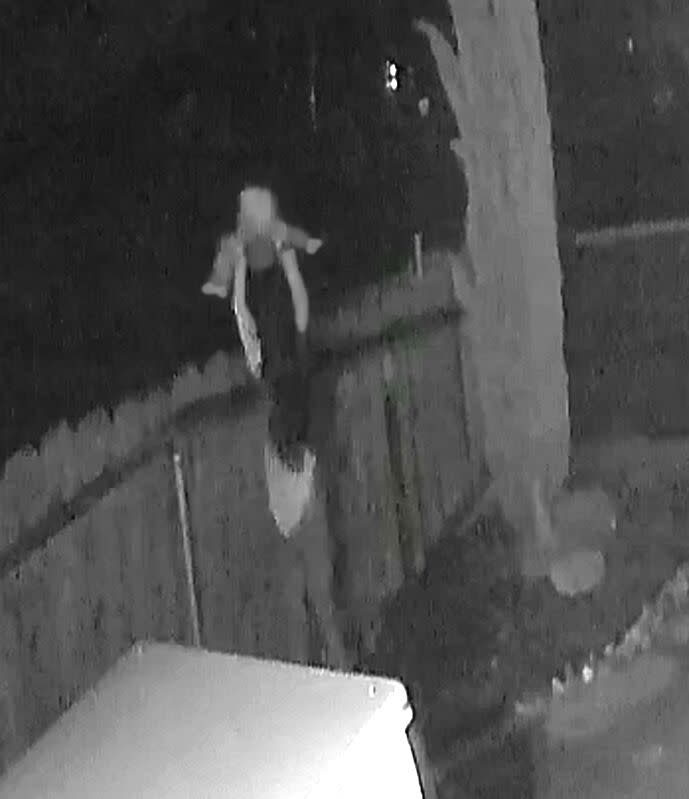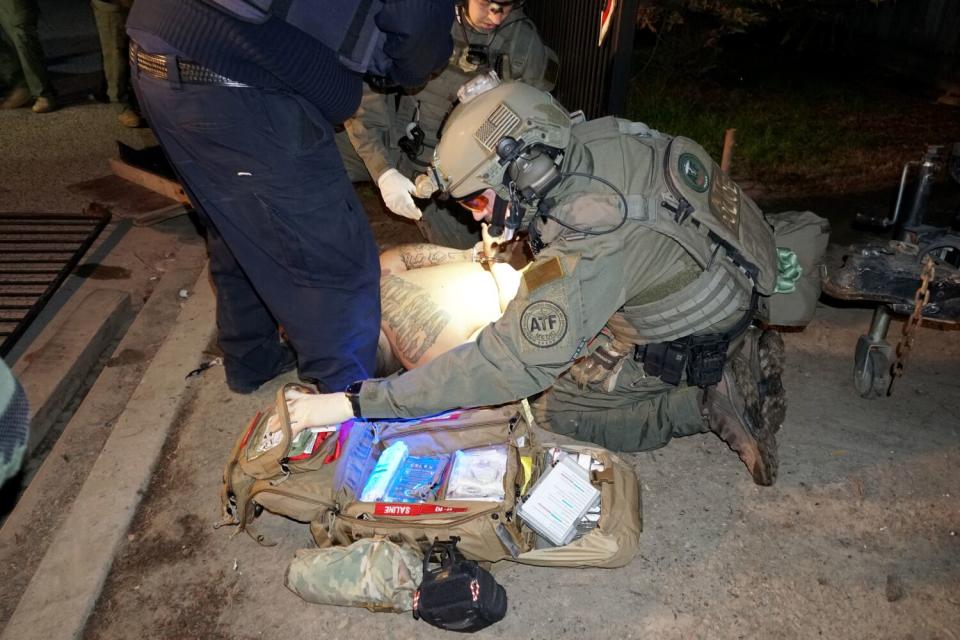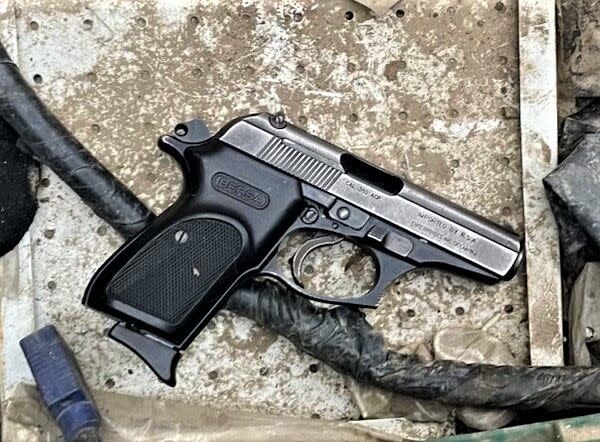Two men arrested in 'cold-blooded' massacre of 6, including mother and baby, in Tulare County

After a predawn gun battle and a series of raids across California, authorities said Friday they had arrested two men accused of killing six people, including a teen mother and her baby, in an execution-style massacre that stunned the Central Valley farm town of Goshen last month.
The suspects were identified as Noah David Beard, 25, of Visalia and Angel "Nanu" Uriarte, 35, of Goshen, both Norteño gang members, according to the Tulare County Sheriff's Office.
Uriarte engaged in a gun battle with federal agents from the Bureau of Alcohol, Tobacco, Firearms and Explosives early Friday and was wounded before being taken into custody, officials said. Tulare County Sheriff Mike Boudreaux said Uriarte, who could face federal charges in the assault of a federal officer, underwent surgery at a hospital and was expected to survive.
Investigators identified Beard as the suspect accused of killing the 16-year-old and her baby.
During the news conference, Boudreaux played a grainy surveillance video showing the young mother fleeing with her son moments before they were killed.

In the video, Alissa Parraz runs across a dark driveway with her baby in her arms toward a locked chain-link gate blocking the street. Unable to escape, she hoists her baby over a nearby wooden fence and lowers him onto something on the other side before running across the driveway and vaulting over the chain-link fence.
Moments later, a man walks toward them. He raises his right arm, a dark shadow of a gun visible in his hand, then the video cuts off. Both mother and child were shot in the back of the head, Boudreaux said.
In audio from a 911 call played during the news conference, a woman inside the house is heard crying and pleading.
“They shot my boyfriend. They keep shooting outside," she says. "I don’t know if they are still here. I’m scared. ... Please hurry, please. I don’t know where they are now — [gasp] — they’re still shooting.”
“They’re still shooting?” asks the dispatcher.
“Yes,” the woman answers. “Hurry please. They’re coming back. They’re coming back. They’re back.”
“Who’s coming back?”
“The guys,” the woman says. “Do you hear them? Someone else is screaming now.”
Shots are heard on the recording.
“That’s them,” the woman says, gasping. “They’re shooting in the house.”
The woman on the 911 call survived the attack by hiding in a trailer, Boudreaux said.
Eladio Parraz Jr., 52, was killed first, followed by Marcos Parraz, 19, and Jennifer Analla, 50, who was shot in her sleep, the sheriff said. Rosa Parraz, 72, was shot in the head while on her knees just beside her bed. Alissa Parraz and 10-month-old Nycholas were the last to die.
"This family was targeted by cold-blooded killers," Boudreaux said.

The Tulare County district attorney's office has charged Beard and Uriarte with six counts of murder and a series of special allegations including multiple murders, and committing murders to further the activities of a criminal street gang.
The Jan. 16 killings instilled fear in Goshen, an impoverished community in the San Joaquin Valley. In recent years, drug trafficking and gang violence have turned sparsely populated rural areas such as Goshen into some of the most violent places in California, but even so, the brutality of a family's massacre shocked the nation, prompting people from as far away as Maine to donate to a reward for the capture of the killers.
At least two members of the Parraz family were Sureño gang members, Boudreaux said, adding that Goshen is considered rival Norteño territory. Beyond that information, the sheriff said investigators had not identified any motive for the slayings.
Evidence that led to the suspects' arrests came in part thanks to DNA analysis, which was expedited by ATF labs in Maryland, Boudreaux said. The suspects had been under constant surveillance since Jan. 23, he said.
"We knew every move they were making," Boudreaux said. "We had them under our wing where we wanted them." The public, he maintained, was never at risk.
The Tulare County Sheriff's Office dubbed the early morning raids Operation Nightmare and said they included search warrants served at three locations in Goshen and nearby Visalia, and at several state prisons, including North Kern, Corcoran, Folsom and Pelican Bay. In all, eight cells and 16 inmates linked to the Nuestra Familia prison gang were targeted.
Federal law enforcement has been assisting the Sheriff's Office in its investigation, along with police departments in Visalia, Porterville and Woodlake. The investigation is ongoing, authorities noted Friday.
The morning after the killings, Boudreaux had declared that the violence was likely the work of a drug cartel. Twenty-four hours later, he modulated that assertion slightly.
“I’m not saying this is a cartel,” he said. “But I am not eliminating that possibility.”
He also complained about what he termed a loose border.
As he announced the arrests Friday, Boudreaux said some of his earlier public statements had been designed to reach the suspects and further the investigation.
"We released information to the media on purpose," he said. "We mentioned cartels, we mentioned gang members up and down the state of California, the potential of them trying to get out of the country. [The suspects] felt we weren’t focusing on them."

Both suspects have a long record with law enforcement in Tulare County.
In October 2021, Beard was arrested by Visalia police and charged with carrying a handgun and cocaine, according to Tulare County prosecutors. That case is pending, said Stuart Anderson, a spokesman for the Tulare County district attorney.
At the time of the arrest, Beard was a fugitive, having violated probation in Kansas' Wyandotte County, where he was convicted of aggravated robbery, according to court records.
He was extradited to Kansas in November 2021 to answer for the probation violation, Anderson said. It’s unclear when he was released. Beard was previously charged in Tulare County in 2016 with hit and run, driving a stolen car and obstructing a Tulare County sheriff’s deputy. He pleaded no contest to hit and run, other charges were dropped, and he served 20 days in county jail, Anderson said.
Uriarte was charged in 2014 in Tulare County with assaulting a person with a handgun, a crime that prosecutors said was committed in association with an unspecified street gang. Anderson said Uriarte pleaded no contest and served about five years of a seven-year prison sentence.
Uriarte and Beard could not be reached for comment.
The Norteño gang the two men allegedly belong to are tied to the Nuestra Familia prison gang, one of two prison-based organizations that hold strong sway over Latino gangs in California. The other is the Mexican Mafia.
The Nuestra Familia was born in the 1960s, formed by state prisoners who resented the Mexican Mafia’s grip over Latino inmates. At its founding, the Nuestra Familia — Spanish for “our family” — was not defined by any geographical divide. Many of its earliest members were from Chino, East Los Angeles and other parts of Southern California.
Over the years, however, the Nuestra Familia came to draw its members from Northern and Central California gangs. A rough line was drawn at Bakersfield: Gangs north of this line answered to the Nuestra Familia, its members identifying both in prison and on the streets as Norteños. Law enforcement officials have noticed that an increasing number of gangs in Northern and Central California now identify as Sureños, meaning they take orders from and pay “taxes” to members of the Mexican Mafia.
In an FBI report reviewed by The Times, a recent defector from the Mexican Mafia said the organization was eager to expand into northern and rural areas of the state, where drugs command higher prices than in Southern California neighborhoods that are saturated with competing dealers.
This story originally appeared in Los Angeles Times.


